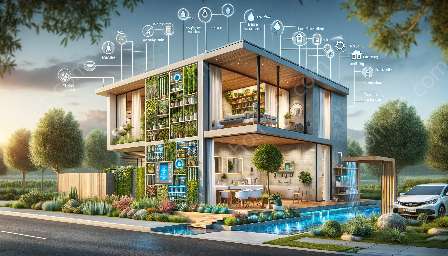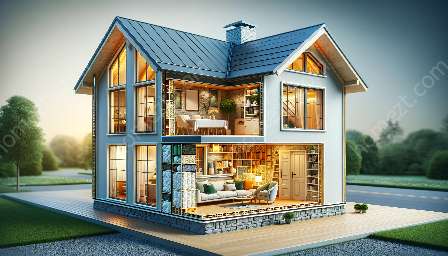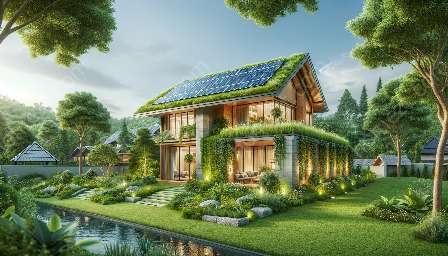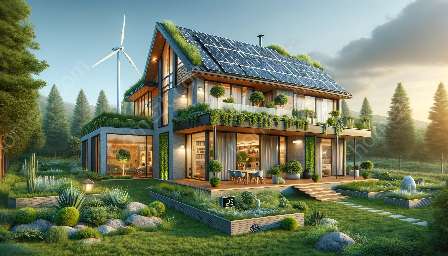Smart home technology offers innovative solutions to improve energy efficiency, making homes more sustainable and environmentally friendly. In this article, we'll explore the exciting advancements in smart home technology and how they align with the principles of green homes.
What is Smart Home Technology?
Smart home technology, often referred to as home automation or domotics, encompasses devices and systems that enhance the functionality, convenience, and energy efficiency of residential properties. These technologies utilize connectivity, automation, and intelligent control to streamline various aspects of home management, including lighting, heating, cooling, security, and appliance operation.
Energy Efficiency in Smart Homes
One of the key objectives of smart home technology is to optimize energy usage and minimize waste. By integrating smart devices and sensors, homeowners can gain greater insight into their energy consumption patterns and implement strategies to reduce their environmental impact. For example, smart thermostats can learn occupants' habits and adjust heating and cooling settings to conserve energy without sacrificing comfort.
Benefits for Green Homes
Green homes, which prioritize sustainability and eco-friendly design, can greatly benefit from the integration of smart home technology. The compatibility of these two concepts allows homeowners to monitor and manage their energy consumption more effectively, with the ultimate goal of creating a harmonious living space that prioritizes environmental responsibility.
Key Features of Smart Home Technology for Energy Efficiency
Let's delve into some of the notable features and components of smart home technology that contribute to energy efficiency:
- Smart Lighting: Advanced lighting systems with automated controls that adjust brightness, color, and scheduling to minimize energy usage.
- Energy Monitoring: Smart meters and monitoring devices provide real-time data on energy consumption, fostering informed decision-making.
- Appliance Automation: Smart plugs and switches enable remote operation and scheduling of appliances to maximize energy savings.
- Efficient HVAC Systems: Smart thermostats and zoning solutions optimize heating and cooling to conserve energy without compromising comfort.
- Solar Energy Integration: Smart technology can seamlessly integrate and optimize the use of solar panels and renewable energy sources for sustainable power generation.
- Smart Home Management Platforms: Centralized control systems and apps offer intuitive interfaces for monitoring and managing energy-related devices and functions.
Real-Life Applications
Here are some practical examples of how smart home technology can be implemented to enhance energy efficiency in a residential setting:
- Automated Lighting: Motion sensors and timed schedules enable lights to automatically adjust based on occupancy and natural light levels, reducing unnecessary energy consumption.
- Intelligent Heating and Cooling: Smart thermostats adapt to occupants' schedules and preferences, optimizing energy usage while minimizing wastage.
- Energy Analytics: Smart meters and energy monitoring systems provide detailed insights into energy usage patterns, empowering homeowners to identify opportunities for efficiency improvements.
- Renewable Energy Management: Integration of solar panels and battery storage systems with smart technology allows for efficient use of renewable energy for powering the home.
Advantages of Smart Home Technology for Energy Efficiency
Implementing smart home technology to enhance energy efficiency offers a multitude of benefits for homeowners, such as:
- Cost Savings: By optimizing energy usage, smart technology can lead to reduced utility bills and long-term cost savings.
- Environmental Impact: Smart homes contribute to a sustainable lifestyle by minimizing energy waste and reducing carbon footprint.
- Convenience: Automation and remote control features enhance convenience while promoting energy-conscious habits.
- Sustainable Living: Smart home technology aligns with the principles of green homes, fostering a more sustainable and eco-friendly living environment.
- Future-Proofing: Investing in energy-efficient technology positions homeowners for future regulatory requirements and energy standards.
Conclusion
In conclusion, smart home technology plays a pivotal role in improving energy efficiency and making homes more eco-friendly. By integrating smart devices, automation, and intelligent controls, homeowners can reduce their environmental impact, save on energy costs, and contribute towards a more sustainable future. Green homes, in particular, can leverage the capabilities of smart technology to align with their eco-friendly objectives and create harmonious living spaces that prioritize energy efficiency and environmental responsibility.






















